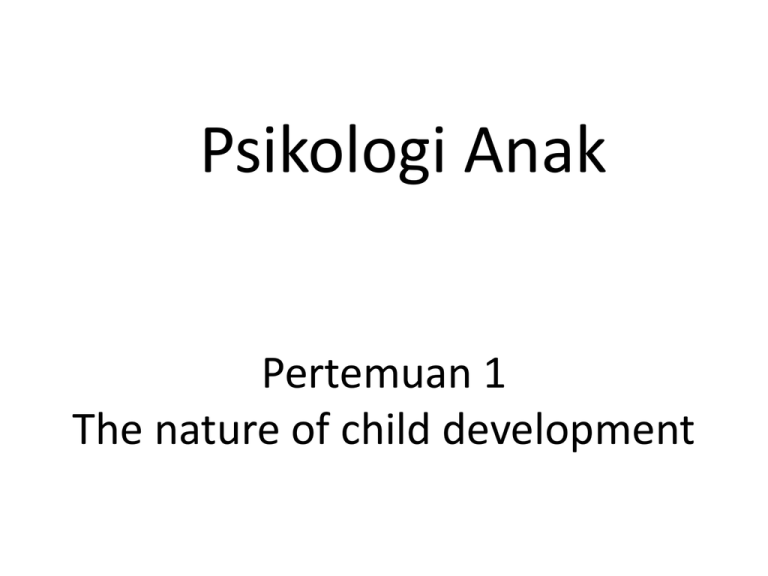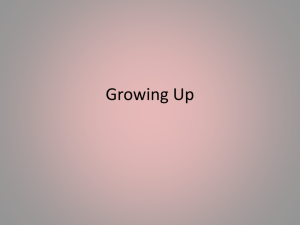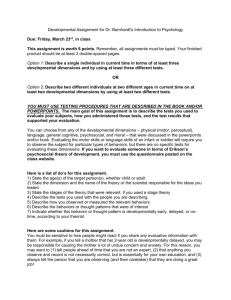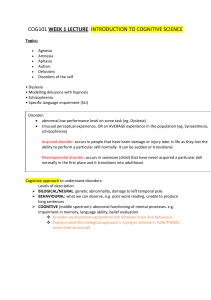Psikologi Anak Pertemuan 1 The nature of child development
advertisement

Psikologi Anak Pertemuan 1 The nature of child development Developmental Processes • Biological processes – changes in individual’s body; genes and hormones • Cognitive processes – changes in individual’s thought, intelligence, and language • Socioemotional processes – Changes in an individual’s emotions, personality, and relationships Developmental processes and periods of development Core Issues in Child Development • Nature and nurture • Continuity and discontinuity • Early–later experience issue Five Major Theories • • • • • Psychoanalytic Cognitive Behavioral and social cognitive Ethological Ecological Psychoanalytic Theories • Describe development as: – Primarily unconscious – Heavily colored by emotion – Behavior is surface characteristic – Analyze symbolic workings of mind – Emphasize early experiences – Biological process important here Erikson’s Psychosocial Theory • Eight stages of development – Primary human motivation is social – Eight stages unfold over the life span – At each stage, unique developmental task confronts individuals with crisis that must be resolved Piaget’s Cognitive Developmental Theory • Children actively construct their understanding of the world – Assimilation: incorporation of new information into existing knowledge – Accommodation: adjusting knowledge to fit new information and experience Vygotsky’s Sociocultural Cognitive Theory • Culture guides cognitive development • Knowledge is situated and collaborative • Memory, attention, reasoning involves learning to use society’s inventions Behavioral Theories • Three approaches: Pavlov, Skinner, and Bandura • Observations in controlled labs – Behavior: observable and measurable – Behavior is learned from experience with the environment Ethological Theory • Behavior – Influenced by biology, tied to evolution – Characterized by critical or sensitive periods – Lorenz: imprinting is rapid, innate learning within a critical period of time – Bowlby’s view of attachment Ecological Theory Bronfenbrenner’s view that development influenced by five environmental systems: – Microsystem – Mesosystem – Exosystem – Macrosystem – Chronosystem Abnormal Child Psychology: Defining psychological disorders • Determining what is normal and abnormal is an arbitrary process • Traditionally defined as a pattern of behavioral, cognitive, or physical symptoms, that is associated with one or more of: – distress – disability – increased risk for further suffering or harm • Many childhood problems best depicted in terms of relationships • Labels describe behavior, not the child • Problems may be the result of children’s attempts to adapt to abnormal or unusual circumstances Developmental Pathways • Refers to the sequence and timing of behaviors, and the relationship between them over time • Two types of developmental pathways: – multifinality: similar early experiences lead to different outcomes – equifinality: different early experiences lead to a similar outcome • With abnormal child psychology, must keep in mind: – there are many contributors to disordered outcomes in each child – contributors vary among children who have the disorder – children express features of their disturbances in different ways – pathways leading to particular disorders are numerous and interactive Risk Resilience risk factors are variables that precede a negative outcome and increase the chances that the outcome will occur typically involves acute, stressful situations, as well as chronic adversity known risk factors include: community violence and disasters, divorce/family breakup, chronic poverty, homelessness, parental inadequacies, parental psychopathology, perinatal stress the ability to avoid negative outcomes despite being at risk for psychopathology associated with strong selfconfidence, coping skills, ability to avoid risk situations, ability to fight off or recover from misfortune not a fixed attribute connected to a “protective triad” of resources and health-promoting events, involving strengths of the child, the family, and school/community




